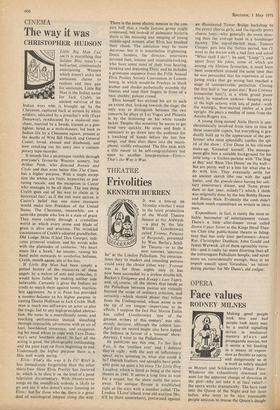CINEMA
The way it was
CHRISTOPHER HUDSON
Little Big Man CAA' Awl) is everything that Soldier Blue wasn't—a well-acted, continuously
entertaining Western which doesn't stake out ambitious claims to realism and then pan for sentiment. Little Big Man is the Indian name for Jack Crabb, an ancient survivor of the Indian wars who is brought up by the Cheyenne, captured back at sixteen by white soldiers, educated by a preacher's wife (Faye Dunaway), re-educated by a snake-oil mer- chant, married by a Swede, trained as a gun- fighter, hired as a mule-skinner, led back to Indian life by a Cheyenne squaw, present at the deaths of Wild Bill Hickok and General Custer, loved, abused and disabused, and now croaking out his story into a contem- porary tape-recorder.
It sounds like a picaresque ramble through everyone's favourite Western scenery, but Arthur Penn, who directed Bonnie and Clyde and that even better film The Chase, has a higher purpose. With a single excep- tion the whites are fools, hypocrites or pos- turing rascals; and the exception is Custer who manages to be all three. The one thing Crabb goes out of his way to claim as 'a historical fact', as if the rest were untrue, is Custer's belief that one more massacre would make him President of the United States. The Cheyenne, meanwhile, are a saint-like people who live in a state of grace. They move calmly through a crystalline world in which every stone and blade of grass is alive and precious. The wrinkled countenance of Crabb's adopted grandfather, Old Lodge Skins (Chief Dan George), indi- cates primeval wisdom, and his words echo with the platitudes of centuries. 'My heart soars like a hawk,' he intones, raising his hand palm outwards to symbolise holiness. Crabb, mouth agape, sits at his feet.
If Little Big Man had been simply a potted history of the massacres of these angels by a nation of sots and imbeciles. it would have failed by making neither side believable. Certainly it gives the Indians no credit to match them against loony, inarticu- late aggressors. As it is: Penn has provided a counter-balance to his higher purpose in casting Dustin Hoffman as Jack Crabb. Hoff- man is much too self-aware an actor to play the tragic foil to any high-principled abstrac- tion. He turns in a marvellously comic and touching performance instead, slouching through impossible adventures with an air of hurt, bewildered innocence, and exaggerat- ing his nasal whine to cope with Faye Duna- way's sexy Southern drawl. In fact all the acting is good, the photography outstanding, and the pace kept up from beginning to end. Underneath the higher purpose there is a film well worth seeing.
Elvis—That's the way it Is ('u' Ritz) is less immediately forgettable than the other
thirty-four films Elvis Presley has featured in, which is to class it on the level of a good television documentary. With twenty-seven songs on the soundtrack nobody is likely to go and see it who doesn't enjoy listening to Elvis: but for those who do, there is a great deal of sociological interest along the way. There is the same electric tension in the con- cert hall that a really famous group might command, but instead of pubescent hysteria there is the moaning and weeping of young middle-aged women after Elvis has brushed their cheek. The adulation may be more decorous but it is nonetheless frightening. Denis Sanders, the director, interviews devoted fans, intense and miserable-looking, who have spent most of their lives hearing, thinking and dreaming Elvis; and he includes a grotesque sequence from the Fifth Annual Elvis Presley Society Convention in Luxem- bourg, in which would-be Presleys in black leather and shades pathetically mumble the litanies and snap their fingers in front of a vast, shabby, patient crowd.
Elvis himself has stylised his act to such an extent that, looking towards the stage, the only way to distinguish between the two concerts he plays at Las Vegas and Phoenix is by the buttoning on his white tuxedo jacket. Despite this economy he seems to get tired very quickly. He stops and finds it necessary to go down into the audience for a touching of hands before the last few songs, and then slurs them into the micro- phone, visibly exhausted. The film ends with a title meant to be self-congratulatory but open to another interpretation—Elvis- That's the Way it Was.


































 Previous page
Previous page